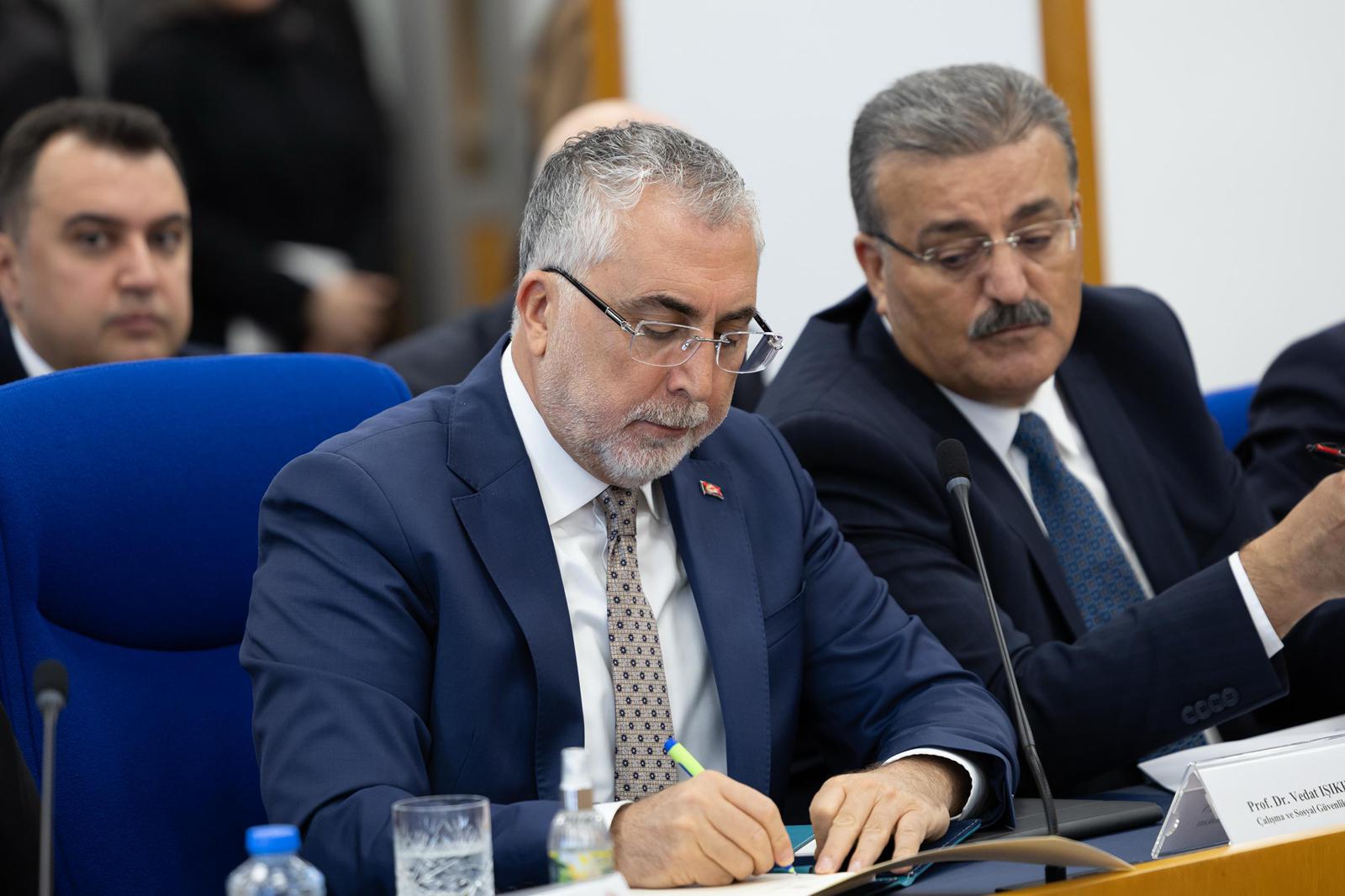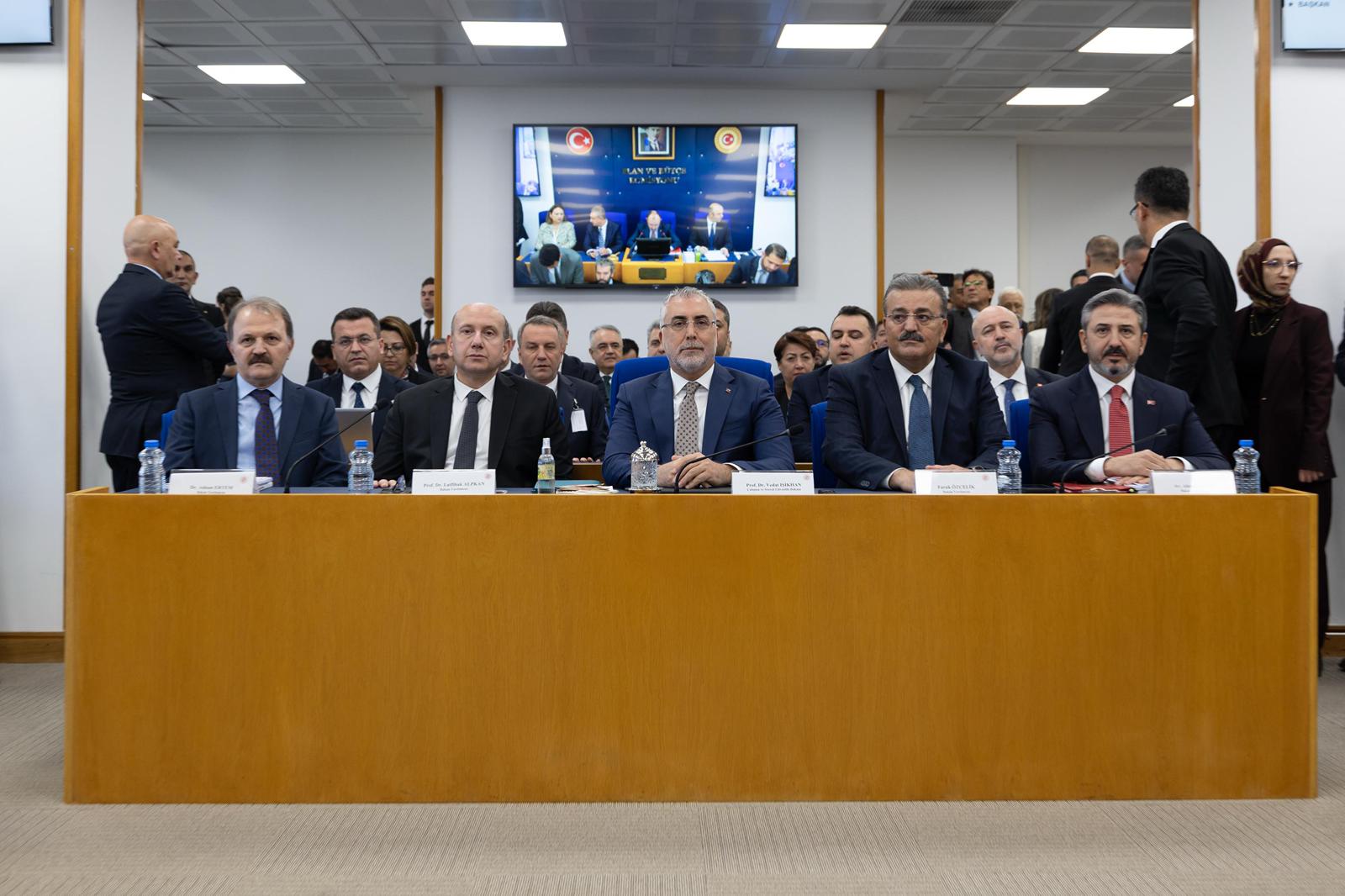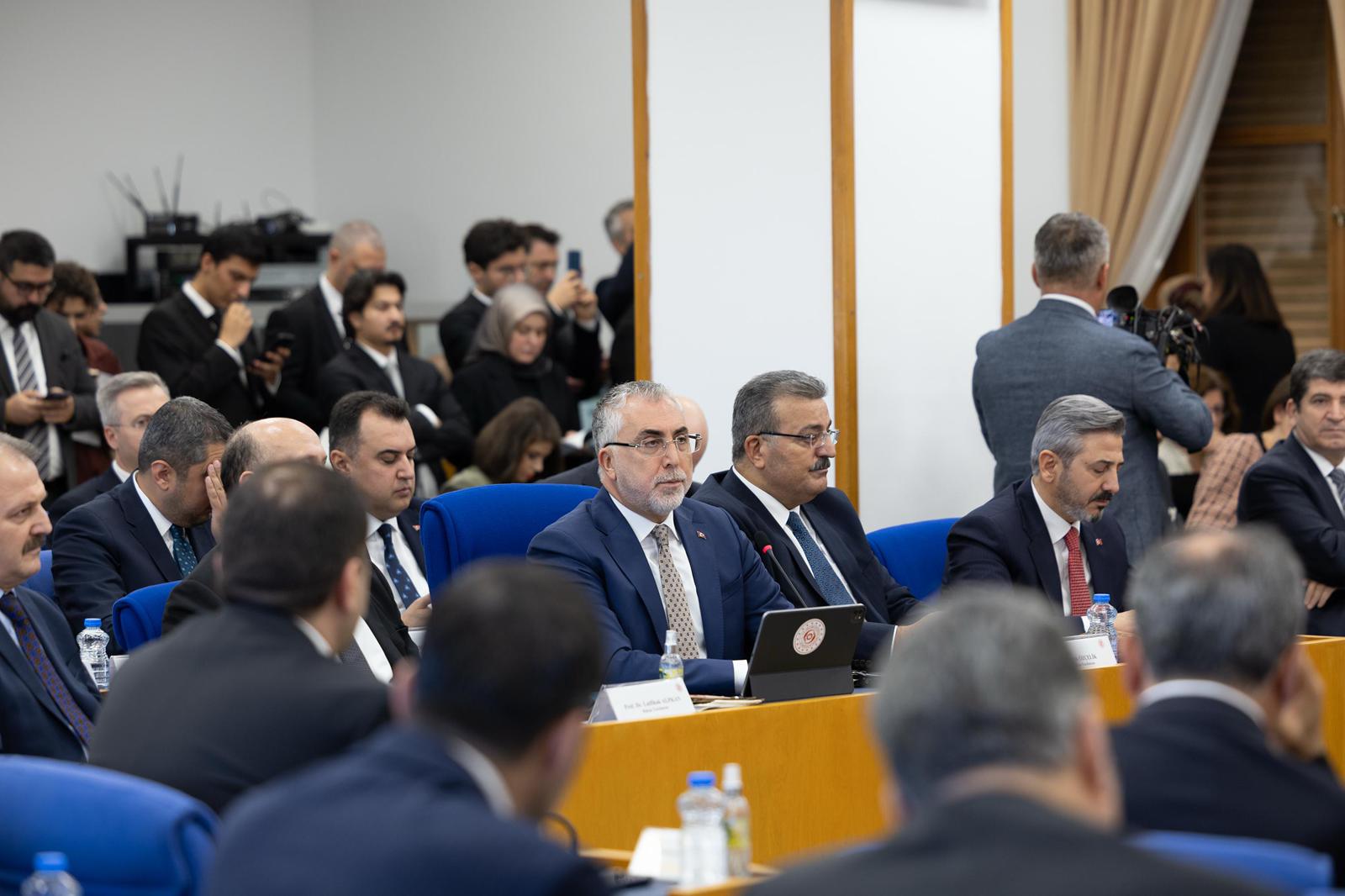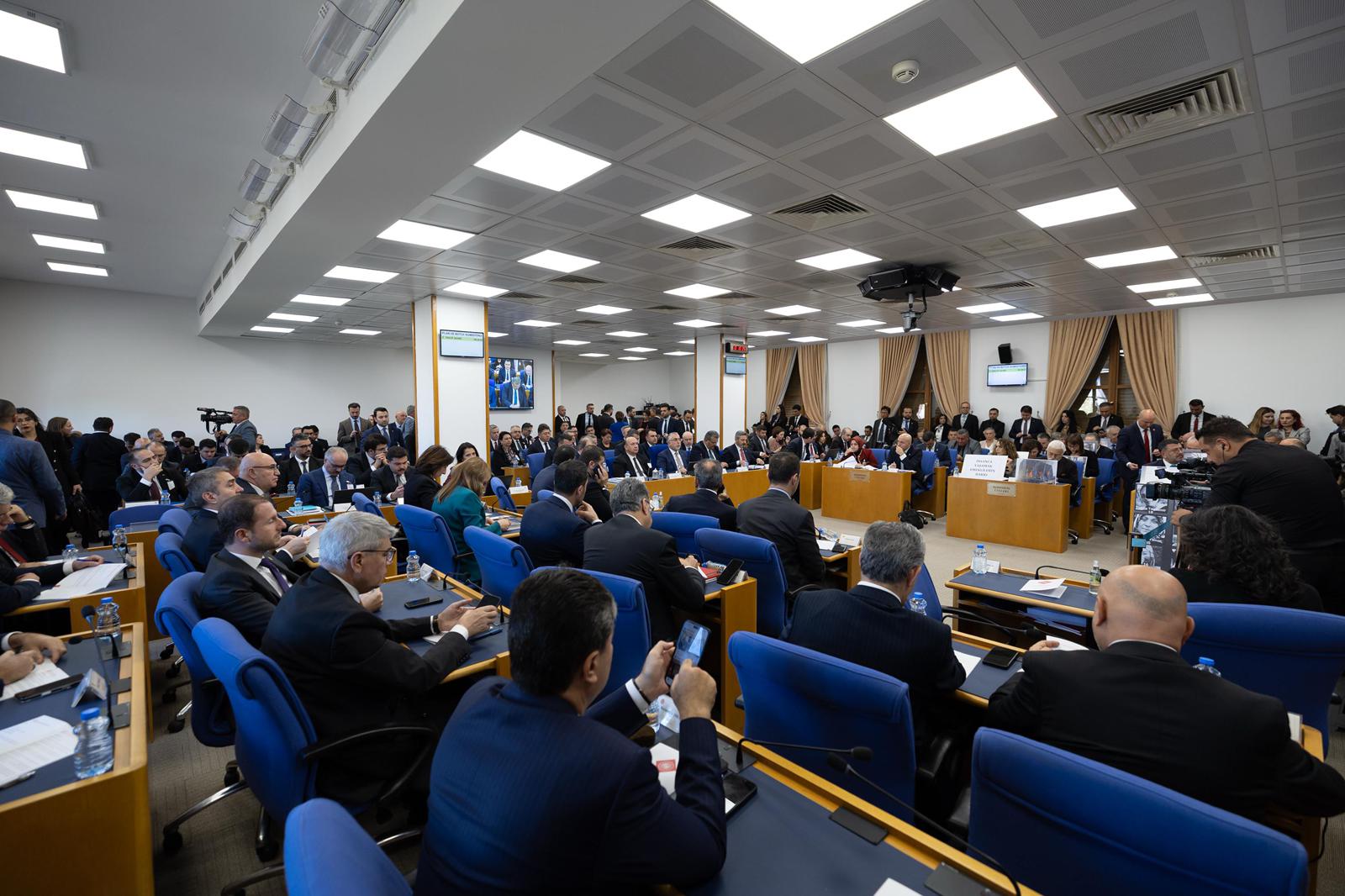2026 Budget for the Ministry of Labour and Social Security Has Been Approved by the Planning and Budget Committee of the Grand National Assembly of Türkiye
13 November 2025, Thursday
2026 Budget for the Ministry of Labour and Social Security Has Been Approved by the Planning and Budget Committee of the Grand National Assembly of Türkiye
2026 budget of the Ministry of Labour and Social Security was approved by the Planning and Budget Committee of the Grand National Assembly of Türkiye, where Minister of Labour and Social Security Prof. Dr. Vedat IŞIKHAN delivered a presentation on the Ministry’s 2026 budget.
Minister of Labour and Social Security Prof. Dr. Vedat IŞIKHAN delivered the presentation of the Ministry of Labour and Social Security’s 2026 budget before the Grand National Assembly of Türkiye’s Planning and Budget Committee.

Extending his condolences to the citizens who lost their lives in the explosion that occurred on 8 November in Dilovası, Kocaeli, Minister IŞIKHAN stated: “Immediately after the explosion, I went to Dilovası to conduct inspections, and I initiated an investigation by assigning our chief inspectors. While the administrative process proceeds, the judicial process is also continuing simultaneously. For the integrity of the investigation, we have suspended a total of seven personnel, including provincial directors of Turkish Employment Agency (ISKUR) and Social Security Institution (SGK) and we will continue to follow this process closely. We are taking all necessary steps to ensure that the investigation proceeds properly, that those responsible are identified and that accountability is ensured”.
Emphasizing that the whole world is confronted with a rapidly transforming working life, Minister IŞIKHAN continued: “Profound changes in the socio-economic sphere driven by technology continue to reshape working life day by day. Phenomena such as digitalization, artificial intelligence, the gig economy, the green economy, green jobs, new working models, and labour mobility have accelerated the global transformation process in labour markets. Across the world, particularly for vulnerable groups, the need for social protection is increasing, while debates concerning employment security and working conditions are becoming ever more significant. Creating not just jobs, but qualified and secure employment has now become a primary issue for every country. Within these global circumstances, demographic transformation has emerged as a defining challenge for both developed and developing nations. Economies with rapidly aging populations are struggling to preserve productivity and social security balances due to the shrinking working-age population, while countries with large youth populations must develop effective policies to facilitate the transition from education to employment. In addition, technological transformation and digitalization are fundamentally altering work practices; while new occupational fields are emerging, unfortunately some traditional sectors are losing their significance.”
Highlighting that all these global trends are closely linked not only to economic indicators but also to social cohesion, equal opportunity and sustainable development, Minister IŞIKHAN continued:
“Increasing the resilience of labour markets, establishing a fair balance between labour and production, preparing social protection systems for the future, and supporting the skills transformation of workers are no longer matters of choice but necessities. I would like to underline that all the goals and priorities we will present here today are aimed at realizing our country’s vision of a competitive, inclusive and production-oriented working life within this global transformation. Regarding the earthquakes centred in Kahramanmaraş—described as the disaster of the century—we implemented numerous measures immediately after the earthquakes to protect our employers and employees in the affected region. To date, with an expenditure approaching 40 billion, we have stood by our workers and citizens through programmes such as short-time working allowance, wage support, community benefit programmes (TYP), and unemployment benefits. As a result of these efforts, the number of insured workers, which stood at 1.889.000 in December 2022, prior to the earthquakes—fell by half after the disaster. However, according to the most recent data for August 2025, the number of insured workers has reached 2,004,000. Thus, I would like to inform you that recovery in terms of employment and labour force in the region has largely been achieved.”

“We Continue to Strengthen Our Working Life with an Approach that Increases Production, Employment and Exports”
Recalling that restructuring periods for employers and employees in the earthquake zone had been extended and that premium debts were also postponed, Minister IŞIKHAN stated: “We have ensured that the force majeure deadlines for our employees, employers and insured persons are extended until 30 November 2025. With an approach that increases production, employment and exports, we continue to strengthen our working life, and we are building our labour market on a structure that is dynamic, responsive to needs and adaptable to current conditions to ensure a stronger future for our country. In this context, the national employment strategy prepared with the aim of ensuring sustainable economic growth, increasing labour force participation, and enhancing the qualifications of the labour force—covering the 2025–2028 period—was put into effect by the Presidential Decree dated 1 February 2025. To ensure the effective use of social dialogue, we are operating the consultation mechanisms provided for in our legislation. In this framework, we convened the Tripartite Consultation Board on 9 October 2025 with the agenda of expanding trade union organization. We also held the Public Personnel Consultation Board Meeting on 30 September 2025 to strengthen social dialogue in the public sector.”
“We Attach Importance to Increasing Trade Unionization Rates in Türkiye”
Minister IŞIKHAN stated that, as the Ministry of Labour and Social Security, they support trade unions, the most important stakeholders of social dialogue in working life and that they attach importance to increasing unionization rates in Türkiye. He continued: “The worker unionization rate, which stood at 9,21 percent in 2013, rose to 14,02 percent as of 2025. Among public employees, the unionization rate rose from 44,94 percent in 2022 to 76,88 percent in 2025. In the recent term, the minimum wage was increased by the Minimum Wage Determination Commission to a net amount of 22.104 lira. Thus, the minimum wage, which was 184 lira in 2002, has increased by 223 percent in real terms. This December, the Commission will convene to determine the minimum wage to be applied in 2026. We hope that a mutually agreed amount will be reached. We increased the minimum wage support to 1.000 lira per month for 2025, and in the first eight months of 2025, we provided approximately 41,6 billion lira in minimum wage support to around 1,5 million workplaces.”
“In 2025, the Increase in the Lowest Civil Servant Salary Reached 29 Percent”
Noting that, according to the decision of the Public Officials Arbitration Board covering the years 2024 and 2025, public officials and retirees received a 6% + 5% raise in 2025, and that with the inflation difference the increases amounted to 11,54 percent in January and 15,57 percent in July, totalling 28,91 percent cumulatively, Minister IŞIKHAN continued his remarks as follows:
“With the raises implemented in July, the lowest civil servant salary increased to 50.503 lira, and thus, in 2025, the increase rate in the lowest civil servant salary reached 29 percent. When we look at the period from December 2002 to July 2025, the real increase in the lowest civil servant salary has reached 264 percent. Under the decision of the Public Officials Arbitration Board covering the years 2026 and 2027, our public officials and retirees were granted a raise of 11% + 7% in 2026 and 5% + 4% in 2027, and should an inflation difference arise, the difference will also be added. Additionally, for the first term of 2026, the base salaries of public officials were increased by 1,000 lira in a way that would affect retirement pensions for the first time in many years. Upon reaching agreement regarding the financial and social rights of workers in public institutions and organizations, the 2025–2026 Public Collective Labour Agreements Framework Protocol was signed. For workers whose gross monthly base wages were below 42.000 lira at the start of the collective agreement term, wages were raised to 42.000 lira, and for those with gross monthly base wages above 42.000 lira, a flat-rate increase of 1.200 lira was applied. Furthermore, public workers received a 24 percent increase in the first six months of 2025, a flat-rate 1.500 lira increase in the second six months, a further 11 percent increase in the second six months, and increases of 10 percent in the first six months of 2026 and 6 percent in the second six months. If an inflation difference occurs, the difference will be added to these raises. The share of labour in national income rose from 24,8 percent in 2002 to approximately 36 percent in the first half of 2025, reaching the highest level in our history. Thus, we will continue to uphold our principle of protecting our workers against inflation and ensuring lasting prosperity for them.”

“While the Number of Workplaces Receiving Occupational Health and Safety Services Was 166 Thousand at the End of 2022, We Increased This to 773 Thousand by the End of October 2025”
Minister IŞIKHAN emphasized that one of the Ministry’s primary priorities is to increase decent employment opportunities, continuously improve working conditions, and elevate occupational health and safety to the highest standards. He stated:
“On 4 July 2025, we convened the National Occupational Health and Safety Council with all our stakeholders. We have begun preparations for the 2026–2030 National Occupational Health and Safety Policy Document, which will set forth our country’s vision in this field. In line with the provisions of the Occupational Health and Safety Law No. 6331, which came into effect on 1 January 2025, we have included public workplaces and workplaces with fewer than 50 employees in the low-risk category within the scope of coverage. While the number of workplaces receiving occupational health and safety services was 166.000 at the end of 2022, we increased this figure nearly fivefold to 773.000 as of the end of October 2025. The number of employees receiving occupational health and safety services, which stood at 6,4 million in 2022, has been nearly doubled to 11.538.000 as of October 2025. Meanwhile, we are implementing inclusive and sustainable programmes from pre-school to higher education to ensure that our children and young people grow up as individuals with strong occupational health and safety awareness.”
“As of October 2025, We Carried Out Guidance and Inspection Activities Based on a Guidance-Oriented Approach in 9.921 Workplaces”
Minister IŞIKHAN stated that thanks to the guidance-oriented inspection approach implemented with 889 labour inspectors assigned to the Ministry’s central organization, approximately 90 percent of the non-compliances identified in workplaces were corrected during the inspection period. He continued:
“As of October 2025, we carried out guidance and inspection activities based on a guidance-oriented approach in 9,921 workplaces. Within this scope, we reached 1.207.422 employees. Through the inspections conducted, we ensured that approximately 954 million lira in unpaid labour receivables was paid to workers and that approximately 540 million lira in taxes and social security premiums was transferred to the public treasury. We imposed 1,1 billion lira in administrative fines on workplaces with ongoing violations of the legislation. When it comes to the sweat and rights of our workers, we take every necessary administrative step within the framework of our legislation and protect their rights.”
Minister IŞIKHAN added that following the local elections, examinations conducted on the 141 notices and complaints they received regarding trade union discrimination, dismissals, and mobbing resulted in the imposition of approximately 66 million lira in administrative fines on municipalities and their subsidiaries, and the payment of 570 million lira in workers’ receivables.

“Thanks to the Decisive Policies We Have Implemented, Employment Reached the Highest Levels in Our History in September 2025”
Minister IŞIKHAN also noted that the Presidential Circular No. 2025 on the prevention of psychological harassment—mobbing—at the workplace had been put into effect, and continued:
“As the Ministry, we held the first meeting of the Monitoring and Evaluation Board for Seasonal Agricultural Work, which is mentioned in Presidential Circular No. 2024-5, issued to improve the living conditions of our seasonal agricultural workers and their families. Since the entry into force of the Circular, we have carried out regional activities in the provinces of Bursa, Bolu, Sivas, Mersin, Ordu, Konya and Şanlıurfa. We are implementing our employment initiatives, which will shape the future of our country, in full coordination with our economic administration. As the Ministry, we are successfully implementing our policies and programmes aimed at preserving and increasing employment. The upward trend in employment and labour force participation observed in 2024 continued in 2025, and thanks to our determined policies, employment in September 2025 reached the highest levels in our history. As of September, over the past year, our labour force reached 35,6 million, our employment reached 32,5 million, our number of unemployed stood at 3,1 million, and our unemployment rate was 8,6 percent. In line with the targets of our Medium-Term Programme, this rate has remained in single digits for the last 29 months.”
“We Aim to Increase Employment by an Average of 600 Thousand People Annually Over the Next Three Years”
Emphasizing that they aim to increase employment by an annual average of 600.000 people over the next three years, Minister IŞIKHAN said:
“According to TUIK data, the youth unemployment rate in the 15–24 age group has decreased by 11 percentage points over the past six years, falling to 14,9 percent as of September 2025. In the same age group, the rate of those neither in education nor employment decreased to 22,1 percent in the second quarter of 2025. In January 2025, ISKUR mediated the employment of 1.286.822 individuals in the private sector. During the 2002–2023 period, ISKUR facilitated the placement of 5,5 million women, 558 thousand persons with disabilities, and approximately 5,5 million young people in jobs. We provide premium support up to 41.000 lira per insured employee to employers who create additional employment. In this context, we have launched efforts to extend the incentive implementation period until the end of 2026. We are also growing the Unemployment Insurance Fund, which finances these support mechanisms, by directing it toward the right investment instruments; as of now, the fund’s assets have exceeded 560 billion lira”.
“Barrier-Free ISKUR Platform”
Noting that they introduced flexibilities allowing employers in the manufacturing industry to benefit from active labour force programmes until 31 December 2026, Minister IŞIKHAN stated:
“To support the participation of persons with disabilities in employment and to allow employers to access employment-related services and other services from a single platform, we established the ‘Barrier-Free ISKUR’ platform. By implementing the Supported Employment Project for individuals with intellectual disabilities, we have begun providing monthly wage support of 26.000 lira for each individual. We have simplified the legislation to enable persons with disabilities to establish their own businesses. In July 2025, we launched the Barrier-Free Labour Force Adaptation Programme, a customized initiative aimed at preparing persons with disabilities for participation in the labour market. We allocated 10.000 quotas for implementation across all 81 provinces, and more than 5.000 of our citizens continue to benefit from these gradually initiated programmes.”
“Through Job Positive Project, We Enabled More Than 1.7 Million Women to Enter Employment by November 2025”
Emphasizing that they have made significant progress in women’s employment, Minister IŞIKHAN said:
“Through Job Positive—the registered women’s employment programme highlighted and praised in OECD reports—we enabled more than 1,7 million women to enter employment by November 2025. We launched the ‘Women’s Touch in Every Profession Project.’ In September 2024, as a new initiative, we implemented the Labour Force Adaptation Programme to encourage the labour force participation of groups facing particular challenges in entering employment, including the long-term unemployed, women, young people, persons with disabilities and students. Since 2024, 374.486 of our citizens have benefited from these programmes. Two percent of the programme participants are women. In February 2025, we implemented the ISKUR Youth Programme announced by the President”.
Open Job Gateway Project
Regarding the major initiatives planned to strengthen the labour market, Minister IŞIKHAN stated:
“In the upcoming period, we will implement our Open Job Gateway Project, which will consolidate job postings published online in our country into a single platform. We will launch a dedicated labour force adaptation programme for young people who are neither in employment nor in education. Through this programme, we aim to introduce young people who do not leave their homes to the labour market through part-time work models and ensure their sustainable employment. We continue our efforts to increase access to basic labour force programmes and to ease the conditions for benefiting from the Unemployment Insurance Fund. In line with the social state principle of our social security system, we are working to ensure that it is more inclusive, constantly evolving, easily accessible, aligned with new working models, and financially sustainable while providing higher-quality and more effective services to our citizens. The ratio of SGK (Social Security Institution) revenues to expenditures, which was 71,5 percent in 2002, is projected to reach 95,3 percent by the end of 2025. Meanwhile, the ratio of premium revenues covering pension payments and healthcare expenditures, which stood at 60,9 percent in 2002, is estimated to reach 75,1 percent by the end of 2025. The SGK deficit-to-GDP ratio, which was 2,2 percent in 2002, is projected to stand at 0,42 percent by the end of 2025.”
Minister IŞIKHAN added that through the premium incentives, supports and discounts they have implemented, they provided 853 billion lira in support to approximately 2 million workplaces due to 13.228.000 insured employees between 1 January 2023 and 31 August 2025. He continued:
“While the number of active insured persons was 12 million in 2002, as of August 2025 it has increased by 115 percent to approximately 26 million. The unregistered employment rate, which was 52 percent in 2002, has shown a downward trend over the years and stood at 25,9 percent according to second-quarter data for 2025. In 2025, intensive inspections were carried out to reduce informal employment, and in the first nine months of the year, 2,3 billion lira in administrative fines was imposed on workplaces employing unregistered workers.”
“Our Social Security Coverage Has Reached 99 Percent”
Stating that they increased the minimum pension to 14.469 lira in January 2025 and to 16.881 lira in July 2025, Minister IŞIKHAN said: “Since 2002, the minimum pension—together with holiday bonuses—has increased in real terms by between 70 percent and 600 percent. Our social security coverage has reached 99 percent. As of July, the state has covered the General Health Insurance premiums of 5,7 million people. The total payment is projected to reach 128,7 billion lira by the end of 2025.”
“As of October 2025, 8,715 Medicines Have Been Included in the Reimbursement List”
Minister IŞIKHAN reported that as of the end of October 2025, 8.715 medicines had been included within the reimbursement scope, and continued as follows:
“In 2025, 353 medicines were included in the reimbursement list, 50 of which are used in cancer treatment. For our children under the age of 18 with Type 1 Diabetes, we included continuous subcutaneous glucose monitoring devices in the SGK reimbursement scope. We are strengthening our incentive mechanisms. We ensured that contrast agents used in CT and MRI imaging are procured by hospitals. In addition to the medicine used in SMA treatment that has been reimbursed since 2017, we added another medicine that offers ease of use to the reimbursement list. A regulation enabling real-time monitoring of health data in intensive care units has been implemented. For patients with Hemophilia A, we included in the reimbursement scope a medicine that can easily be administered subcutaneously at home. We increased the number of medicines that family physicians can prescribe. Today, a total of 6.000 medicines can be prescribed by family physicians. Another important development is that, as of July 2025, five different immunotherapy medicines used in the treatment of 25 different cancer types, as well as the medicine used in the treatment of cystic fibrosis, have been included in the SGK reimbursement list.”
Regarding the 2026 budget proposals for the Ministry of Labour and Social Security and its affiliated and related institutions, Minister IŞIKHAN shared the following information:
“The total budget proposal for our Ministry for 2026 is 447 billion 903 million 261 thousand lira. For the expenditures of the Ministry’s central and overseas organization, 5 billion 772 million 98 thousand lira has been proposed. A total of 442 billion 131 million 163 thousand lira is projected to be allocated in 2026 as follows: 305 billion 35 million 369 thousand lira to the Social Security Institution, and 137 billion 85 million 794 thousand lira to the Turkish Employment Agency. As for the Vocational Qualifications Authority, one of our Ministry’s affiliated organizations within the central government budget, its expenditure budget amounts to 280 million 439 thousand lira, the revenue budget to 278 million 439 thousand lira, and net financing to 2 million lira. As will be seen in the 2024 final accounts, the budget allocated to our Ministry was used effectively and efficiently in the public interest, without exceeding appropriations, in line with savings principles and measures. In the audits conducted on behalf of our Grand National Assembly by the Court of Accounts for our Ministry and its affiliated and related institutions, it was concluded that the financial reports and statements for 2024 provided accurate and reliable information in all material respects. In the Court of Accounts audit reports, 27 findings were identified for 2024, 12 of which were found to stem from accounting transactions.”
Minister IŞIKHAN emphasized that terrorism has imposed a very large social and economic cost on Türkiye for many years, and stated:
“As we progress confidently towards the goal of a Türkiye free of terrorism, our country will grow stronger in unity, solidarity, and brotherhood. We believe that this process will increase business and investment opportunities in our country and provide significant contributions to our economy. I would like to note that we will use our 2026 fiscal year budget in the most effective and efficient manner.”
Following the discussions at the Grand National Assembly of Türkiye’s Planning and Budget Committee, the 2026 budgets of the Ministry of Labour and Social Security and the Vocational Qualifications Authority were approved.






